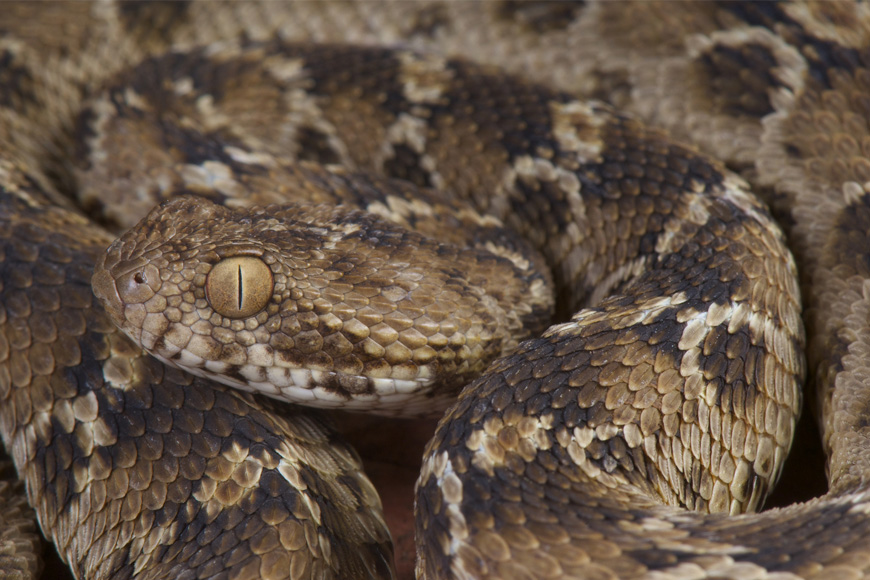The UAE is home to the world’s deadliest snake amongst others that residents should be aware of
22 November 2018
| Last updated on 19 January 2020
Pictured: Saw-Scaled Viper
Every year there are reports of snakes spotted in Dubai and other emirates.
Especially in recent years, as cities have expand into the desert - more and more reptiles are finding comfort in the benefits of living close to built-up areas.
Because of the easy access to shade, water and prey, more snakes are settling in in communities and residential buildings across Dubai.
SEE ALSO: This video shows two lions roaming a beach in Dubai
If you spot a snake however, you needn’t be afraid – as there are few deadly poisonous types of snakes in the UAE, and fatal encounters are extremely rare.
Are there snakes in Dubai?
There are several types of snakes that live in Dubai, which may also be found across the UAE both on land and sea. These include:
- Annulated Sea Snake
- Arabian Cat Snake
- Arabian Cobra
- Arabian Gulf Sea Snake
- Arabian Horned Viper
- Arabian Sand Boa
- Awl-Headed Snake
- Beaked Sea Snake
- Brahminy Blind Snake
- Diadem Snake
- Hooked Thread Snake
- Hooded Malpolon
- Saw-Scaled Viper
- Persian (False) Horned Viper
- Schokari Sand Racer
- Wadi Racer
- Yellow Sea Snake
- Yellow-Bellied Sea Snake
Most of the above are totally harmless, and have no venom glands at all – these types only have small teeth, which they use to hold on to their lunch (mostly mice).
The Hooded Malpolon and the Cat Snake found in the UAE are only slightly venomous, and bites are usually treated with anti-histamines. These snakes are primarily found closer to the mountains in the UAE.
If you’re wondering if there are poisonous snakes in Dubai – yes, there are very venomous snakes living in the UAE. These snakes and their bites may cause a fatality if the victim is not treated quickly enough. Poisonous types of snakes in Dubai include; Persian (False) Horned Viper, Arabian Cobra, Saw-Scaled Viper and the Arabian Horned Viper.
The world’s deadliest snake in the UAE
The Saw-Scaled Viper (Echis carinatus sochureki) is a type of venomous snake that is frequently sighted in Dubai and the UAE.
Armed with a powerful venom and lightning reflexes, the Saw-Scaled Viper is the country’s deadliest snake. The reptile, who one preferred sandy desert regions, is now attracted by residential areas that provide an abundance of water and prey.
Particularly during the UAE’s summer months, between May and October, the Saw-Scaled Viper are more active as they like to head indoors, find shade and regulate their body temperatures.
SEE ALSO: Noise complaints against dogs in Dubai - what can happen
Fortunately, the snake is not aggressive by nature and if disturbed, is more likely to flee than lash out. They can grow up to 80cm, and prey on rodents, lizards and frogs.
The snake’s first instinct is to quickly slither away from danger but if an individual attempts to catch or kill the snake, it will coil into a horseshoe shape and rub its scales together to produce a rasping sound.
If ignored, the snake will deliver a series of strikes.

Pictured: Horned Viper
What to do if you find a snake in Dubai and UAE
First of all, do not play with it or try to chase it. Remove all children and pets from the surrounding area.
You can never be truly sure what type of snake you’re dealing with – so it’s better to avoid the encounter and call a pest control company immediately.
What to do if you’re bitten by a snake in Dubai and UAE
Anyone bitten is advised to follow a strict procedure – there are several do’s and don’ts that you need to know.
DO:
- Stay calm and immediately call an ambulance
- Remove any watch/jewellery on the targeted area
- Keep the bitten part of the body in a vertical position and do not move it
- Clean the wound with a piece of cotton or tissue, but do not attach it to the wound – bandages should be strapped lightly and blood circulation shouldn’t be restricted
- Take a picture of the snake to present to the doctor, without putting yourself at risk
DON’T:
- Take pain killers
- Put ice on the wound
- Cut the area in an attempt to release the venom, and don’t try to suck out the poison – this will only increase the loss of blood
- Wash the wound with water
- Drink alcohol or caffeine
A snake’s venom slowly prevents the blood from clotting. A human body reacts to poisonous venom with pain and swelling, which is then followed by systemic bleeding within 6 to 72 hours. If untreated, a snake bite may cause internal haemorrhaging and eventually organ failure.




.png?itok=HBSyMDok)









































































.png)


























.png?itok=0fOAXkOm)

























.png?itok=EH_x0Pha)
